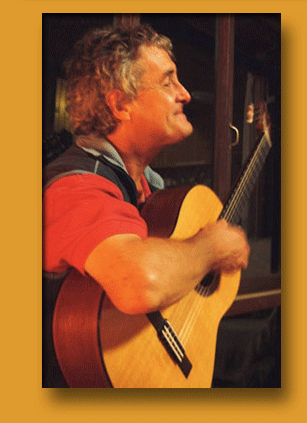| This site is mainly about
the poetry, ghazals, of Francis Brabazon
which I have been setting to music since 1972. The ghazals
are found in two books, ‘In Dust I Sing’
and ‘The Beloved Is All In All’,
and along with the preface below are copyrighted by Avatar’s
Abode Trust, Woombye, Queensland. The music is copyrighted
by me but feel free to download and enjoy.
Francis Brabazon wrote as his preface
for ‘In Dust I Sing’:
The eternal Beloved, Avatar
Meher Baba, over the years I was with him at Meherazad
gave me the shape and content of these poems.
The form is based on the Persian ghazal, perfected by Hafiz
600 years ago and carried down in the Urdu language to the
present day. The content is the relationship between the Lover
and the Beloved – a relationship that is never wholly
fulfilled until the Lover ceases to exist in himself and passes
away in the Beloved.
This relationship has its root in the very nature of God, which is love.
As Baba has explained it: God is Love. And Love must love.
And to love there must be a Beloved. But since God is Existence
infinite and eternal there is no one for Him to love but Himself.
And in order to love Himself He must imagine Himself as the
Beloved whom He as the Lover imagines He loves.
But besides making the ghazal, which was some 200 years old then, the
ideal form for love poetry, Hafiz also used it as a vehicle
for philosophy, teaching and general comment – for these
are also part of the divine love game.
The ghazals of Hafiz and his successors were the only poetry that Meher
Baba really enjoyed. Although occasionally he would
quote a verse of Tukaram or Kabir, with the ghazal writers
he was the Wine Master filling our cups with the various types
and vintages. Similarly, although he sometimes listened to
Indian devotional songs and classical music and to Western
popular songs and spirituals, he only really enjoyed ghazal
singing and its more popular form, qwaali. (He listened
to the others to please those who got pleasure from them because
their love pleased him.) But when there was a really good
ghazal singer – one whose heart was tuned to the cry
of love and its courtesies of complaint and whose throat was
a threshold to the Beloved’s presence - Baba would sit
up all night listening, commenting, revealing the hidden treasure
in the verses, until the dawn stole the Beloved’s rose
garland and flung it across the sky as a sign that another
day in the Beloved’s service was beginning.
After some time I conceived the idea of an English ghazal. I wrote a
few, and waiting a suitable time, told Baba about them. He
had me fetch and read them to him. He seemed pleased and told
me to continue writing in this new form and to read them to
him in batches of four as they were done. Each reading brought
the blessing of his embrace, and ever embrace contained the
seeds of the next pieces. In the years that followed Baba
had them all re-read to him many times.
Why Meher Baba put the idea of an English ghazal into my head can only
be explained in terms of whim – that he had
a whim for a new kind of poetry for his entertainment and
time-pass, a poetry with its root in the perfection of Hafiz
but contemporary in language and image, and which would be
the ideal vehicle for the new dialogue of the Lover and the
Beloved which will be the New Humanity.
F.B. |

















